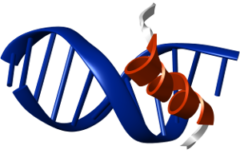20th Structural Biology Club of the Czech Society for Structural Biology
online on
31 January 2024, 13:00
with the following scientific talks kindly delivered by our guests
Biophysical Characterization of Selective Antibody Depletion Compounds (SADC) – Molecular composition and longtime stability evaluation of SADCs using SEC‐MALLS and nanoDSF
Presented by Arthur Sedivy, VBCF Protein Technologies, Vienna BioCenter Core Facilities GmbH, Vienna, Austria
Selective Antibody Depletion Compounds (SADC) are compositional molecules consisting of a carrier protein with conjugated functional groups. They allow selective depletion of unwanted antibodies in the bloodstream (e.g. drug neutralizing antibodies) to generate a therapeutic window for better treatments. In this study the OMNSEC (a SEC‐MALLS system) was used to investigate a variety of SADC constructs, property of Ablevia – a Vienna Bio Center campus startup company, to find optimal production conditions as well as to characterize the molecular composition of the SADCs. The structural integrity and thermal stability of the SADCs was characterized using the Prometheus (nanoDSF). Both methods were subsequently used to evaluate the long time stability of the SADC constructs under different storage conditions.
Seeing chemistry in biology using neutron macromolecular crystallography
Presented by Lukáš Gajdoš, Institute Laue‐Langevin, Grenoble, France
Neutron Macromolecular Crystallography (NMX) is a complementary technique to X‐ray crystallography that provides the direct location of hydrogen atoms in macromolecular structures. Hydrogen atoms play crucial roles in biological functions, so determining their precise location is essential for a better understanding of biological processes, such as enzyme catalysis or ligand binding. NMX offers information on the protonation state of amino acid residues, the orientation of water molecules, proton transfer, and the hydrogen bonding network in ligand binding. Moreover, neutrons are a non‐destructive probe, allowing data collection at ambient temperature, closer to physiological conditions. The talk will cover the basics of neutron macromolecular crystallography, focusing on practical aspects involved in sample preparation and structure refinement, illustrated with several case studies
Moderator: Josef Houser, Masaryk University, CEITEC, Brno, Czech Republic
Please, join us on this Zoom link (join 5‐10 minutes before the beginning) https://cesnet.zoom.us/j/92170333913
